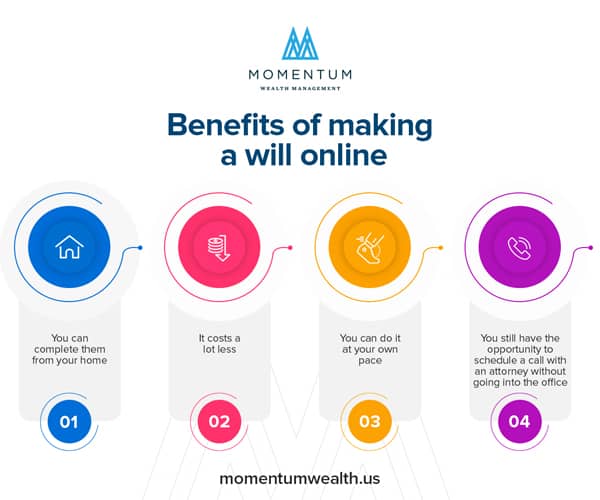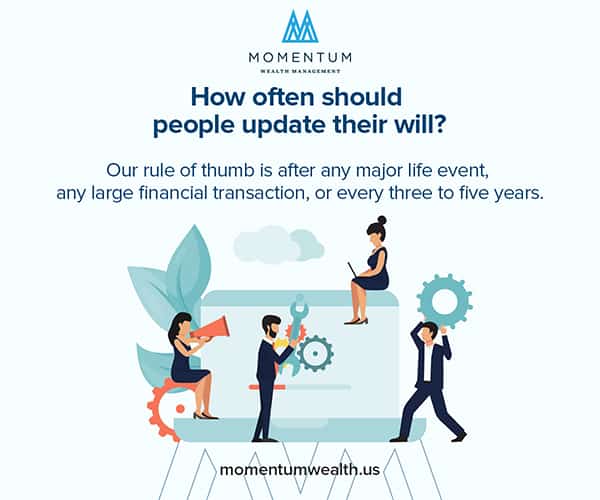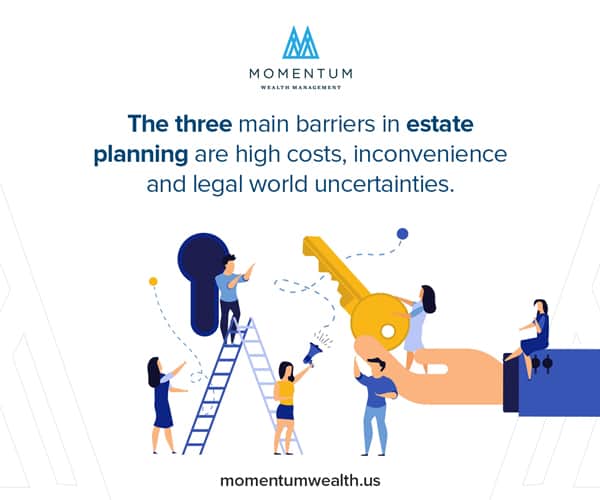Take a global pandemic, add an emotionally filled election, and you get a big year for the history books. On the bright side, this year has taught us to appreciate the simple pleasures in life. Some say it took a global pandemic to really make us find the joy in little things. But what is it about COVID that makes us reevaluate? It all boils down to the fact that 2020 has forced us to address our own mortality. It’s not a warm and fuzzy mental space to be in, but there is a plus side.
COVID has prompted more and more people to secure end-of-life documents. According to the financial advisory organization DeVere Group, inquiries have increased by 76 percent since the start of the COVID outbreak in the UK. And, some legal and financial experts argue that having a will is one of the most important things you can do for yourself and your family.
At Momentum Wealth, we believe that a will provides clear direction on what someone wishes to happen with the things they were responsible for in life. That could be property, money, children, pets, etc. If you don’t have a will, your assets are left up to the courts.
Sounds like a nightmare for your loved ones, right?
Creating a will is not as hard as you think. Even during a pandemic. You don’t have to take time off work or spend a fortune. You can stay in your loungewear in the privacy of your own home, all the while making afterlife decisions. A much more comfortable scenario than an attorney’s office.
Momentum Wealth has partnered with Trust & Will, an online estate planning start-up that has seen a 50% uptick in users this year. The founders set out in 2017 with the idea that if the tax industry could make the tax process easy to do online (hence, TurboTax), then why can’t the estate planning industry do the same? Trust & Will’s mission has always been to help protect every American family by making estate planning simple, affordable, and accessible.
I recently sat down with Trust & Will’s head of legal, Patrick Hicks, as well as business development manager Andres Mazabel, to answer commonly asked questions.

Please give me a little background on Trust & Will and what the company offers to those wishing to create end-of-life documents.
Patrick (T &W): Trust & Will is an online service providing legal forms and information. Our goal is to make the process of setting up a guardianship, will, or trust as simple and straightforward as possible. We handle most needs for most people. Below is a breakdown of our users:
- 75% are under 54 years old
- 65% have children
- 54% own real estate
- 8% of a business
Tell me about the partnership between Momentum Wealth and Trust & Will?
Patrick (T&W): Financial advisors encourage clients to set up estate plans. About a year ago, Trust & Will started an advisor program to partner with financial institutions, giving their clients an affordable solution for will creation. Trust & Will’s platform is a huge benefit to advisors that have clients across the country.
Garrett Cottle (MW): For us, it’s all about the combination of professionalism and convenience. With clients that span 9 different states, we need to be confident in the solutions we’re recommending and the ability of those solutions to fit wherever the client is at that moment. Trust & Will fits this bill for us.
What are the benefits of making a will online versus hiring an attorney? Are costs similar?
Patrick (T&W): What Trust & Will offers is comparable to what you would see with an estate planning attorney. The documents are very similar, but at Trust & Will, we make it very easy to use these documents. You can complete them from your home, it costs a lot less, we’re available 24/7, you can do it at your own pace and you still have the opportunity to schedule a call with an attorney without going into the office. We offer ease of use, convenience, and affordability.
Obviously, costs vary across the country, but it’s not unreasonable to have a lawyer charge $1,000 – $2,000 to prepare documents similar to the documents included in Trust & Will’s base plan.
We charge $90 for an individual and $160 for a couple. Trust & Will does not have to pay large overhead fees, support a large staff, pay off law school debt, etc. The technology side allows us to keep costs down.
 When do most people suddenly realize they need to make a will?
When do most people suddenly realize they need to make a will?
Patrick (T&W): Around important life events: marriage, birth or a child, death of a family, or current event. And, COVID is obviously impacting how people think. People generally hold off on estate planning because they don’t think they need it. With the pandemic, people are starting to realize that it’s better to be safe than sorry.
What do people need to know or decide before creating a will? Do people need to do their homework?
Patrick (T&W): One of our goals is to make all of the questions on our site easy-to-understand with simple language – very similar to Turbo Tax. Therefore, you really don’t need to have any prior knowledge of estate planning. The things that you do need to think about are: What do you want? What do you want your estate plan to say? Who do you want to benefit? Do you have any sentimental gifts to leave?
Be prepared to make those personal choices. The good news is that everything is saved as you go, so you can always go back and make changes later. The feedback that we often hear at Trust & Will is that people are surprised the process is not as daunting as they originally thought.

How often should people update their will?
Patrick (T&W): Our rule of thumb is after any major life event, any large financial transaction, or every three to five years.
Where should people keep their will? Do they need a hard copy?
Patrick (T&W): Trust & Will keeps a copy of all documents created. However, most states require wills to be a tangible document: a written document with a physical signature, on paper. For storage, a fireproof safe is a great option or somewhere safe in your house. We also suggest letting your executor and loved ones know where you’ve left it.
What type of security does Trust & Will use to protect user’s information?
Patrick (T&W): We take security very seriously. Trust & Will uses bank-level security, encrypts all information received and uses access credentials. We limit any access to information shared by users. It’s also worth mentioning that information that is shared by users is much less sensitive than people imagine. We do not ask for social security numbers, passwords, or specific financial account numbers. Trust & Will only needs basic information about family preferences and assets.
Why are people so scared to make a will?
Patrick (T&W): For a lot of people, it’s a new experience and they have little understanding of how the process works. On top of that, people associate wills with death, which forces them to face their own mortality. This can be an uncomfortable situation. That being said, we find that most people are surprised by how easy Trust & Will makes the process.
What are a few of the strangest things that you’ve seen someone request (or pass down) in their will?
Patrick (T&W): We have a lot of specific, unusual, and very personal distributions. A lot of those are things that may seem odd to an outsider but may have tremendous sentimental value, plus a huge impact on the beneficiary.
Where we really see a lot of individuality is with specific requests, particularly with instructions for funerals and memorial services. Some people have songs picked out, playlists, guest lists, attire requests – even a preference on the color of their casket.

Last question, what do you want people to know about Trust & Will?
Andres (T&W): The three main barriers in estate planning are high costs, inconvenience, and legal world uncertainties. It can seem very complicated. At the end of the day, Trust & Will has created a platform that’s easy to use, plus we’re a company that will continue to focus only on estate planning.
Patrick (T&W): We also want people to know that the quality of the documents produced is truly top-notch. You pair that with phenomenal customer support (and over 1,200 reviews with an average 4.9 customer rating), and the product speaks for itself.
The information in this article is for general informational and educational purposes only, and should not be construed as investment, tax, or other financial planning advice.
